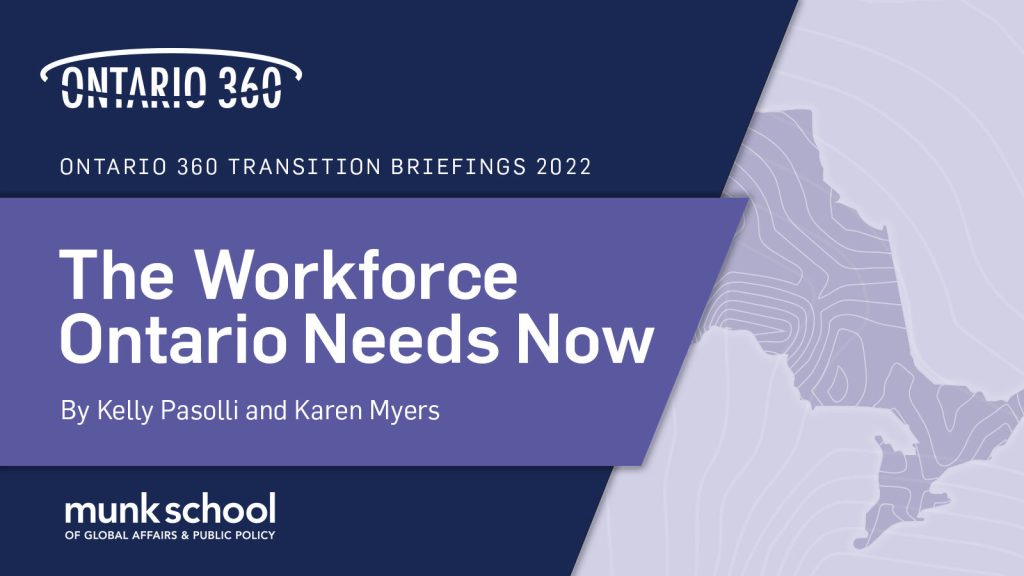The nature of work is changing rapidly. As Canadians adapt, the skills development ecosystem is under pressure to adapt alongside them – ensuring that people are supported to thrive in their careers and that businesses have the talent and skills they need to succeed.
The challenge
Job polarization, digital transitions and labour shortages are all putting pressure on Canada’s skills development systems to meet new and evolving needs. Working adults are changing jobs more times throughout their lives: multiple career transitions are becoming the rule, rather than the exception. In late 2021, 43% of working Canadians reported that they were likely to look for a new job in the next year.
If we don’t do more to help individuals to prepare for these transitions through access to career guidance and lifelong learning opportunities, Canadian workers – and, by extension, our economy – are at risk of being left behind.
Our current state
Currently, our employment and skills development programs have a “fail-first” approach to supporting working adults that primarily offers help to people once they are already unemployed. As a result, most services are designed to help people without jobs get work as soon as possible. While these services are important, their narrow scope is not well-suited for the majority of working-age Canadians – for example, people who are in precarious jobs or are changing industries.
This approach also means that by the time most workers access publicly funded services, they are already in a state of crisis. We know from behavioural science research that being in a state of stress significantly reduces our cognitive decision-making abilities – making this a challenging time for someone to be making informed choices about the next step in their career journey.
For working Canadians looking to proactively build new skills that make them more resilient to career transitions, finding the right programs and supports can be difficult. While there are promising training programs across Canada that help those looking for a new job build the technical and soft skills they need, most of these programs are operating at a small scale, are expensive to deliver and are not currently connected to a cohesive policy strategy.

The rise of micro-credentials is seen by many as a promising development that can help address this challenge. Micro-credentials offer short-term, flexible training that adults need to proactively reskill and upskill. However, there remains a lack of clarity on how these credentials connect to specific employment pathways and whether they can effectively demonstrate skills and competencies to employers. Micro-credentials and other part-time education options also cost money – but financial supports for lifelong learning in Canada are fragmented and difficult to access. In many cases, eligibility is restricted and the supports are not sufficient to cover the upfront costs of investing in learning and training opportunities.
In short, our current skills development ecosystem is not equipped to meet the evolving needs of Canadian adults: more people need more support to navigate their career options, prepare for transitions and pursue lifelong learning. When we also consider the limited time, resources and energy that many working adults have to devote to lifelong learning and career planning, it’s clear that we’re not doing enough. Many working adults – and the businesses that rely on their skills and talent – are at risk of being left behind.
What needs to change
Better pathways to lifelong learning opportunities: To better support adult learners, we should be focusing on developing more targeted, flexible and personalized learning pathways. In an ideal future state, adult learners would be able to select and combine different learning modules throughout their working life that give them the right skills, at the right time, to achieve their career goals.
“In short, our current skills development ecosystem is not equipped to meet the evolving needs of Canadian adults …”
Right now, the proliferation of education and training options on the market make it difficult for learners to know what education options are worth the investment and will signal value to employers. Government and other stakeholders could be doing more to support the design and delivery of flexible, modular learning options, and to engage employers to make sure that these pathways lead to in-demand learning outcomes and career progression.
Better access to targeted career guidance services: We also need to find ways to connect more adults with high-quality career navigation services. The fast-paced changes in the labour market and the complexity of the education and training marketplace mean that working adults need more support assessing their options and making informed decisions about their training and career pathways.
To get there, one option is to leverage our existing publicly funded employment services and better equip them to provide career guidance to people at all stages of their career journeys. In practical terms, this could look like investments in new training and professional development opportunities for employment service practitioners, and piloting innovative service models focused on delivering high-quality, hands-on career guidance to working adults.
Better financial supports for skills development and learning: Finally, we should explore new forms of financial assistance and wraparound supports that encourage lifelong learning and address the very real barriers that many adult learners face in accessing education and training opportunities. This could include approaches like lifelong learning accounts that provide portable funds which are available to people regardless of their employment status.
The opportunity
A robust and dynamic Canadian workforce will need robust and dynamic employment and skills training supports to meet the challenges ahead. By helping more Canadians navigate their careers and access learning opportunities – whether they are working or not – decision-makers will be setting up a skills ecosystem that is better prepared for a changing world of work.




